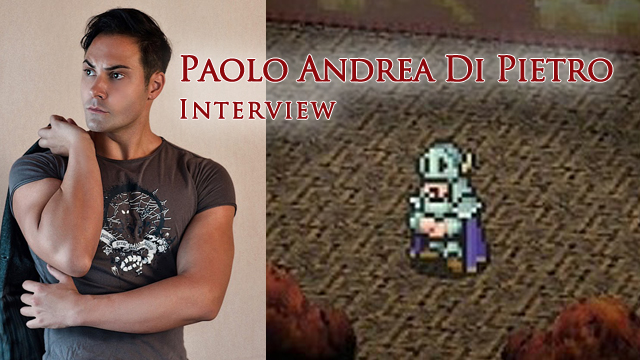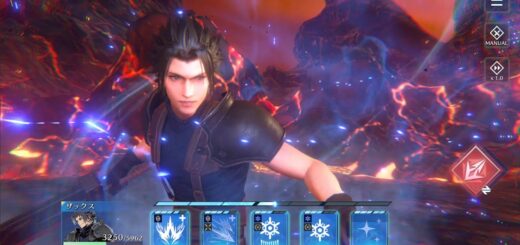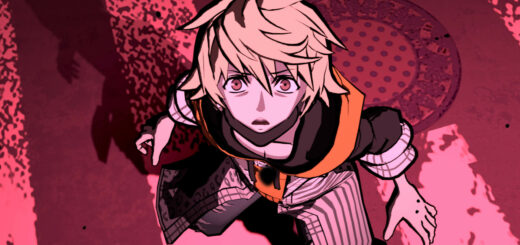Final Fantasy VI’s Paolo Andrea Di Pietro Interview
Final Fantasy VI, which was originally released for Super Nintendo in the west in 1994, has often ranked as one of the top RPGs of the 16-bit era. One of most interesting and unique aspects of the game was the opera scene, complete with an aria entitled ‘Aria di Mezzo Carattere‘, which was written by Nobuo Uematsu. Due to the hardware limitations at the time, there were no recorded vocals; however, with the release of Pixel Remaster version, the opera scene had vocals recorded in six different languages. Elmon Dean Todd had the opportunity for an exclusive interview with Draco’s singer, Paolo Andrea Di Pietro, about his singing role behind the scenes of one of the most iconic JRPG scenes of all time. Better known as ‘Paolo’ in Japan, he has sung Draco’s lines in Italian and French for the Pixel Remaster.
Elmon Dean Todd: Could you tell us about yourself?
Paolo Andrea Di Pietro: My name is Paolo Andrea Di Pietro, known in Japan simply as “Paolo”. I was born in Milan, Italy, but I’ve been living in Tokyo, Japan, for the last 7 years. I was exclusively an opera singer in Italy, but since moving to Japan I’ve been working more as a TV personality, actor, and recording artist in various musical genres (not only opera).
Other than singing, I work mostly in commercials. I think I have acted, narrated, or sung in over 100 different commercials during the last 5 years.
EDT: How did you become a singer?
Paolo: What gave me the inspiration to become a singer was Nobuo Uematsu’s track “One Winged Angel” from Final Fantasy VII, which was the first video game I really got into. I still couldn’t understand English at the time, so I played the whole game with a dictionary in hand and I learnt the language that way. When I got to the ending of the game, after hours and hours of already beautiful music, hearing for the first time a human choir during the final battle had a huge impact on me. After that I got interested, first, in choral music and oratorio, then opera.
After experiencing FF7 I also went back and played Final Fantasy VI and the opera scene, too, had a huge impact on me. I began studying singing and guitar at the civic music school near my house in my early teens, and then I entered Milan Conservatory at the age of 19.
EDT: How did you start your singing career in Italy?
Paolo: I won a singing competition which let me have my debut in the main role of Figaro from Mozart’s “The Marriage of Figaro”, after that I passed an audition for AsLiCo, which is a very important Italian association for young opera singers, that allowed me to perform in many famous Italian theatres at a pretty high level.
EDT: When did you transition over to working in Japan?
Paolo: Working as a singer in Italy was quite stressful — it was hard to get paid from the theatres after the performances; it would always take months and months of begging and usually some legal action, so I tried to get a contract with The Royal Opera House in London. I took the annual audition but failed the final stage and was really disheartened about my whole opera career.
Just after that I got offered work as a singer in a luxurious wedding venue in Kyoto for one year. During that time I would go back and forth between Kyoto and Tokyo. In Tokyo I took part in some opera performances and joined some music agencies and started working on commercial songs and narrations. For a certain commercial they needed a foreign actor with a big presence and voice, and I got asked to join the audition by one of the agencies I was working with as a musician.
It was my first strictly acting audition. There were over 80 people at the audition but I got the role. The commercial was a big success and it became a series that has been going on for over 4 years, and I became somewhat of a meme here in Japan with my catch phrase “じゃあいいですぅ” (Jaaiidesuu). That regular job led me to a lot more acting jobs and the notoriety from those helped me get jobs as a recording artist in anime and video games.
EDT: The catch phrase ‘じゃいいですぅ’ (Jaaiidesuu) is very popular in Japan. How did it come about?
Paolo: They first asked me to speak Japanese with an American accent when portraying that character, but instead I proposed an accent based on Milan’s dialect, and that’s what made it unique. When I play that character, I always think about how my grandmother, who spoke strictly in dialect, would sound like in Japanese.
EDT: How difficult is it for a non-Japanese person to break into the talent/acting scene in Japan?
Paolo: I would say it’s actually easier for a foreigner than for a Japanese. You just have to know what unique traits you can bring to the table and offer that. In my case it was the depth of my voice, the size of my body (I’m 188 cm / 6’2 which is quite huge here in Japan) and my knowledge of western music and languages.
It’s also important to learn the local language and adapt to the cultural differences and work ethics here in Japan. In acting, for example, there are very long shooting hours — sixteen-hour shoots with little chance for rest are pretty common because of the cost of locations per day. Being able to pull through them with fortitude and humility, instead of complaining against something that the whole staff has to deal with, is what will make you get appreciated and called back for the next productions. I’ve seen with my own eyes some of the biggest stars here in Japan going through some really troubled productions without a single complaint. It was quite a surprise for me, coming from opera, where many singers and conductors were often very childish and egotistical. Prima Donnas (of any sex) in opera are absolutely real and actually quite common.
EDT: Any memorable moments you care to share about working in Japan?
Paolo: One of the funniest jobs I ever did was playing the Ketchup Demon during a musical comedy sketch on live television, together with comedians Naomi Watanabe (who played the Soy Sauce Demon) and Yuuki Iwai (the Salt Demon). The Ketchup Demon became a top trend on Japanese Twitter and I received a lot of fan art depicting the character. I usually get recognized for my appearances on commercials or TV shows, but when somebody recognises me as the “Ketchup Demon”, I feel particularly proud about it.
EDT: Which video game / anime job did you get first?
Paolo: My first job for anime was for Bubuki Buranki. The composer, Masaru Yokoyama, who I met at a party, contacted me on Facebook and asked if I could sing in some tracks. I also wrote the lyrics in Latin and sang during the last battle of the series.
EDT: How did you start working for Square Enix?
Paolo: My first job somehow related to Square Enix was actually for the Dragon Quest: The Adventure of Dai anime. During the same period it began broadcasting, a new very funny “Jaaiidesu” commercial was on TV. I was a regular on a variety TV show and I did the Ketchup Demon sketch that went viral.
But as video games go, my first contribution was singing “The Happy Turtle Jingle” and the “Extravagant Turtle Flyer Fanfare” for Final Fantasy VII Remake Intergrade. During some Japanese interviews and on Twitter, I stated how much I loved Square Enix and Final Fantasy VII, and Mitsuto Suzuki from Square Enix contacted me for recording those tracks. They are a bit of an in-joke because I work a lot in commercials and those jingles are used as publicity for the Happy Turtle bar in the Final Fantasy VII world.
EDT: You have performed ‘Aria di Mezzo Carattere’ in both Italian and French. Can you tell us about the recording process?
Paolo: I was recommended for this project by Mitsuto Suzuki (yes, Suzuki-san helped me realise both the dream of singing in Final Fantasy VII and singing the opera scene), but sadly it was near the end of the casting process and they were still looking only for Italian and French Draco and Italian Ralse. I say ‘sadly’ because I have already studied and sung in all the 7 languages used in the remaster. The same applied for my Brazilian friend Roberto Di Candido, whom I recommended for the Italian Ralse. I got approved right away for the Italian part, but I had to send some videos of me singing in French to be approved by the French localisation team.
EDT: Did you meet anyone from the Square Enix staff?
Paolo: Roberto and I recorded in a small studio in Tokyo. The arranger of the opera part, Daisuke Shiiba, and the sound director, Hidenori Miyanaga, were present. The various localisation teams were, instead, listening in remote to ensure of the delivery of the text. The Italian soprano, Antonella Rondinone recorded in the same way from Italy. I really enjoyed her interpretation — she is actually not singing in a fully operatic style, but rather closer to musical, using vibrato only in the more heartfelt phrases, to simulate how Celes isn’t a fully trained operatic singer, but still a natural talent as commented in game.
EDT: You’ve played Final Fantasy VI prior to recording. How did it rank to the other Final Fantasy games for you?
Paolo: Yes, after playing Final Fantasy VII, I played Final Fantasy IV, Final Fantasy VI, and Chrono Trigger right away. My personal Final Fantasy “top 3” would probably be VII, X, and then VI. I absolutely love VI, but it probably had less impact on me because I played it after VII.
EDT: Can you tell us about the songs you’ve done for the Dragon Quest: The Adventure of Dai anime?
Paolo: I like watching anime while training with dumbbells. Some years ago I was watching My Hero Academia and Haikyu!! and I thought the music really stood out, and it was also very good for working out. I looked them up and found out that both anime series had the same composer, Yuuki Hayashi.
I wrote to him on Facebook and complimented him on his music, and he wrote me back saying that he knew about me and how he would have loved to work together. About 7 months later he contacted me for singing in the new anime adaption of Dragon Quest: The Adventure of Dai. I sang the theme of the ‘Great Demon King Learn‘, the main villain of the series.
EDT: Are there any other video game/anime projects you have worked on?
Paolo: I’ve worked on Overlord, Saga of Tanya the Evil, Knights of Sidonia, and I sing the current ending theme of Otoppe.
EDT: What about current or future projects?
Paolo: I recorded some new tracks for The Adventure of Dai, which will be released in the near future. Also starting from March 28, the new anime Thermae Romae Novae will stream worldwide on Netflix. I wrote the lyrics and performed the opening of that anime. In addition, I wrote the lyrics of all the insert songs, and I taught voice actor Kenjirou Tsuda all his Latin lines. I even stood with him in the recording booth, which was a very good learning experience!
EDT: Any advice for those looking to move to Japan and try their hand at acting or singing?
Paolo: First of all, learn Japanese, starting from memorising and being able to think using the Hiragana alphabet (Katakana and Kanji are secondary). After that, I would advise enrolling in some Japanese language school in Tokyo (there are also many short summer courses), and while attending there look up all the agencies who work with freelance models.
Many Japanese talents start from modeling, so don’t worry even if you don’t think you look like a “model”, because there are many modeling jobs which aren’t related to high fashion and beauty. Then, register in those so that you can have access to auditions and begin creating connections in the entertainment industry.
RPGamer and Elmon Dean would like to express our deepest thanks to Paolo Andrea Di Pietro for letting us learn about the behind-the-scenes recording process of Final Fantasy VI and for answering our questions. Final Fantasy VI Pixel Remaster is currently available for PC via Steam. Follow Paolo Andrea Di Pietro on Twitter: @paoloadp ; Instagram: @paolojapan









Recent Comments